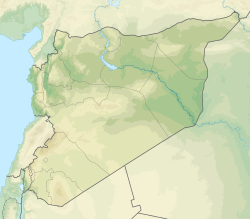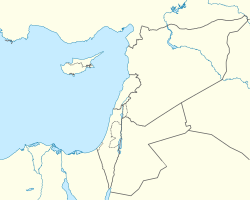Bosra
بُصْرَىٰ بُصْرَىٰ ٱلشَّام | |
|---|---|
| Busra al-Sham | |
 Bosra Central Square | |
| Coordinates: 32°31′06″N 36°28′50″E / 32.51833°N 36.48056°E | |
| Grid position | 289/214 |
| Country | |
| Governorate | Daraa |
| District | Daraa |
| Subdistrict | Bosra |
| Population (2004) | |
• Total | 19,683 |
| • Religions | Sunni Muslim Shia (minority) |
| Area code | 15 |
| Official name | Ancient City of Bosra |
| Criteria | Cultural: i, iii, vi |
| Reference | 22 |
| Inscription | 1980 (4th Session) |
| Area | 116.2 ha |
| Buffer zone | 200.4 ha |
Bosra (Arabic: بُصْرَىٰ, romanized: Buṣrā), formerly Bostra (Greek: Βόστρα) and officially called Busra al-Sham (Arabic: بُصْرَىٰ ٱلشَّام, romanized: Buṣrā al-Shām), is a town in southern Syria, administratively belonging to the Daraa District of the Daraa Governorate and geographically part of the Hauran region.
Bosra is an ancient city mentioned in 14th century BC Egyptian sources. A key Nabatean city, it became the prosperous provincial capital of the Roman province of Arabia Petraea following the dissolvement of the Nabatean kingdom.[1] With the advent of Christianity, Bostra flourished as a Metropolitan Archbishopric, under the jurisdiction of Eastern Orthodox Patriarchate of Antioch and All the East. It also became a Latin Catholic titular see and the episcopal see of a Melkite Catholic Archeparchy.
Throughout its history under various Muslim rulers, the city maintained its strategic importance as Syria's southern gateway. It attracted attention from Damascus' rulers and was governed by various lords, serving as a hub for Islamic learning and endowments. However, it declined into a village during the Ottoman era, only to be revitalized in the 20th century with the construction of the Hijaz railway and due to growing archaeological interest, later prompting tourism-focused development by the Syrian government. Today, it is a major archaeological site and has been declared by UNESCO as a World Heritage Site.[1]
According to the Syria Central Bureau of Statistics (CBS), Bosra had a population of 19,683 in the 2004 census. It is the administrative center of the nahiyah ("subdistrict") of Bosra which consisted of nine localities with a collective population of 33,839 in 2004.[2] Bosra's inhabitants are predominantly Sunni Muslim, although the town has a small Shia Muslim community.[3]
- ^ a b Sharon, M. (2007-01-01), "Sites", Corpus Inscriptionum Arabicarum Palaestinae, Addendum, Brill, pp. 43–44, ISBN 978-90-474-2073-6, retrieved 2024-02-13
- ^ General Census of Population and Housing 2004. Syria Central Bureau of Statistics (CBS). Daraa Governorate. (in Arabic)
- ^ Batatu, 1999, p. 24

